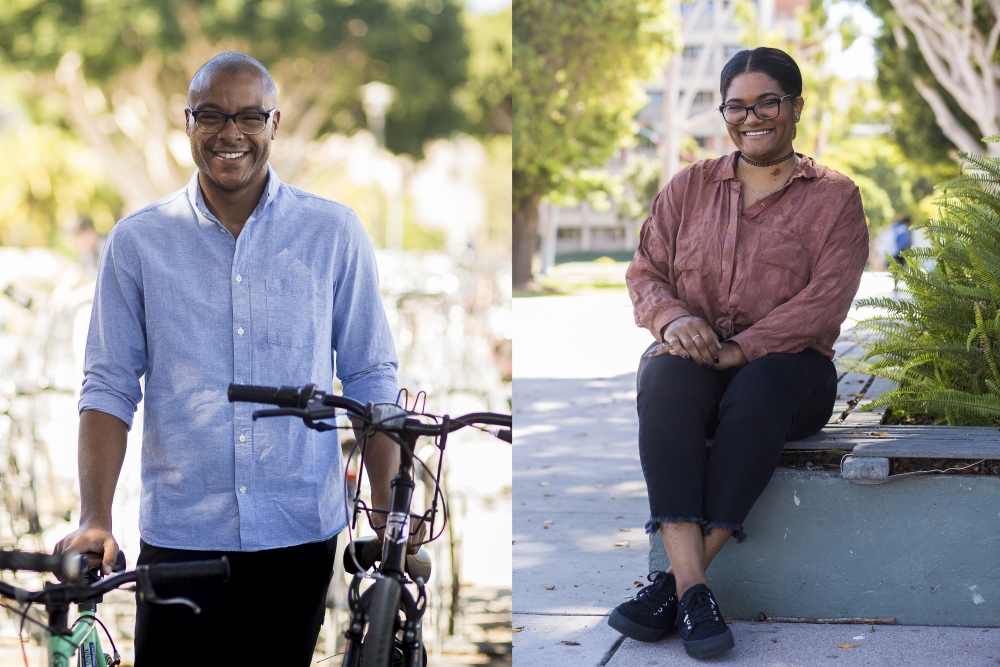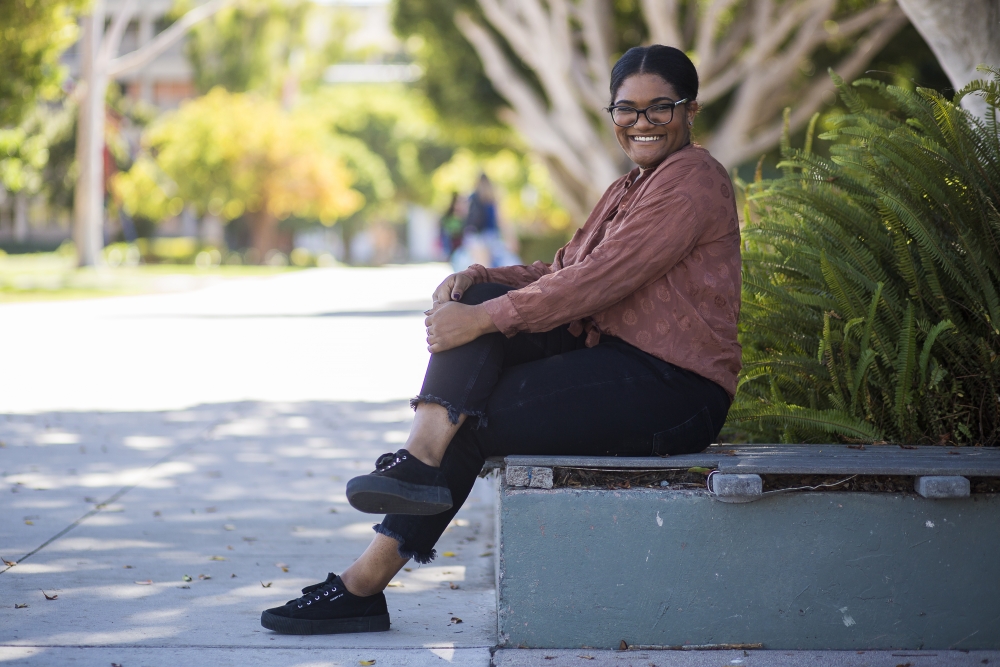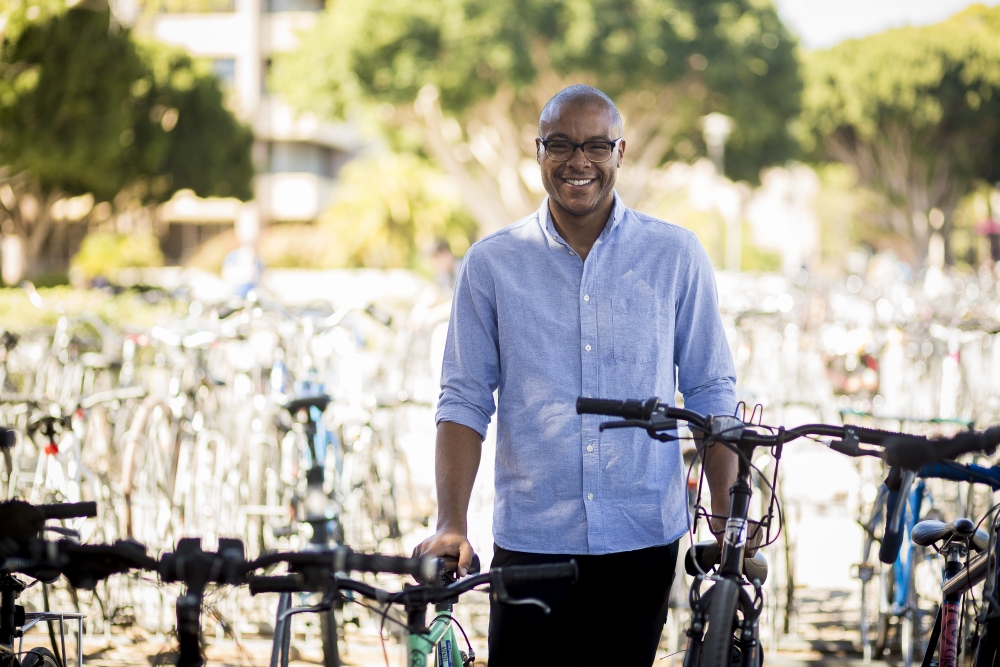A Fresh Start
She held on as long as she could.
Recruited to play softball for UC Santa Barbara on a full-ride athletic scholarship, Meme Moore stood out as a catcher. As a student, she struggled. Academics were smooth sailing for her in high school, but university courses? She found herself not only in rougher waters, but trying to navigate a different and unknown sea.
“My grade-point average my first year here was the worst of my life, a 1.3,” said Moore, who was placed on academic probation as a result. “It was really hard to climb my way back up, but I did. For my sophomore and junior years I was able to keep my GPA where it needed to be to play softball, but by my senior year it was just too much. My GPA was not good, I didn’t have the credits I needed to graduate and I was dismissed.”
That was in 2016. When Moore at last graduates in 2020 — a full four years after she expected to — it will culminate an arduous journey to her degree.
And for this final leg, the homestretch, she credits UC Santa Barbara’s Scholar Retention Program (SRP) for getting her back on track. The unique initiative, created, founded and run by the Office of Financial Aid & Scholarships, helps eligible students such as Moore to re-enter the university and, ideally, to complete their degrees.
“The Scholar Retention Program was piloted in 2017 as a way to support academically dismissed UC Santa Barbara students as they pursue reinstatement to the university,” explained Natalie González, assistant director of financial aid and scholarships, who spearheaded the launch of SRP. “This cross-departmental initiative provides holistic support to students who are dedicated and motivated to continuing their education and ultimately, to graduating from UC Santa Barbara.”
Students who are academically dismissed can enroll in summer courses to improve their academic standing and, potentially, to be reinstated. But academic dismissal renders them ineligible for Title IV financial aid, creating a barrier for those with financial needs who may not have the resources to pay full freight for summer session and living expenses.
“Students who may be ready to return may have to take a few years off before they are able to pay for a summer term,” González said. “Selected participants in SRP receive a retention scholarship to cover the cost of tuition and fees for approved summer coursework. And participation in SRP provides them with resources and tools to help them through the readmission process.”
Those tools encompass training in time management, ongoing guidance and counseling from financial aid advisors and regular check-ins with program staff. Also — and crucially — they include important perspectives from professionals and fellow students who have been through similar travails by way of the program’s dedicated summer course INT 10.
“Navigating a large research university can be really challenging, and for students that face academic dismissals it’s not necessarily a reflection of their ability to succeed,” she added. “Maybe they’re first in their family to pursue a higher education degree, or maybe they were not familiar with how to seek out resources or mentors. In some cases, they were in a major that wasn’t a good fit or they had personal situations arise that impacted them academically. Sometimes, it’s a little bit of everything.”
It was everything and then some for Jaymes Johnson, who first entered UC Santa Barbara as a freshman in 2004. Like Moore, he cruised through high school pretty easily; the demands of college hit him like a brick wall. Then came the added stress of his grandmother’s death — they were extremely close — and his coming out as a gay man.
“My classes suffered because all of these things,” Johnson recalled recently. “By the end of my first quarter I had been put on academic probation and by the end of that year I was disqualified and asked to leave the university. I went back home.”
Johnson spent two years completing his general education requirements at Santa Monica College before returning to UC Santa Barbara in 2007. It turned out to be another false start. Early that first year back, his father was diagnosed with cancer; constant worry and regular trips home to Los Angeles took their toll, and he again left campus.
But, Johnson said, he always knew he would finish his degree: “I wanted to check that box.” Some 15 years after he first came to UCSB, he’s finally getting the chance, thanks to SRP.
“Just to have been reinstated, and to be finishing what I started so long ago — it feels really, really good,” said Johnson, who is tracking to graduate in June 2020 with a degree in English, a minor in art history and designs on graduate school. “Connecting with people from the program who are interested in seeing my success, and feeling that I’m ready for it, is a different experience. It’s been wonderful.”
“Jaymes’ situation could have been completely avoided if he’d known where to go back in the beginning, but he didn’t,” said Holly Roose, director of the campus’s Promise Scholars Program and an SRP affiliate who is a devoted mentor to its students. “And he’s not alone. Probably 80 to 90% of the issues that derail students and get them disqualified academically are avoidable. We are taking steps now, with SRP, to work toward making the multilayer changes we feel will help future students avoid those issues. Most students are struggling in some way; it’s about figuring out how to balance it all so that it doesn’t derail your life in the wrong direction.”
Approximately 500-800 students each term — as many as 2,400 per year — are placed on academic probation, Roose said. Annually, some 13% of those, or about 300 students, end up being dismissed. In order to return to the campus, they must raise their grade-point averages by taking summer courses, among other requirements.
SRP in 2017, its first summer, served ten students. Expanding quickly since then, it grew to 35 students for summer 2018 and, this most recent summer, to 50 students.
The Office of the Registrar; BARC, the campus’s receivable system; Summer Sessions; the Educational Opportunity Program; and the Colleges of Letters & Science and of Engineering all collaborate with financial aid to bring eligible students back to campus and to help streamline the process.
“Each year we re-examined the program and found additional ways to support students,” González said. “We’ve had a lot more departments reach out and express their support for the program, which reinforces how important it is. And we’ve had students who went from being dismissed to studying abroad, becoming research assistants, applying to graduate school and much more within the next year after being reinstated.”
“We recognize that everyone’s story is different and therefore every reinstatement story is its own unique experience,” she continued. “SRP highlights how financial support along with academic support services can help students achieve their goal of completing their degree. As the program grows, we continue to think about ways to strengthen and improve it, so that every SRP student is able not only to be reinstated, but, ultimately, to graduate.”
When Moore officially returned to campus this past summer — she remained in Santa Barbara after dismissal, working full-time to support herself — she achieved her highest GPA to date. Now deep into fall quarter into her final year, finally, she’s on a mission to finish strong.
“I always knew I’d be back — it’s been me chasing that piece of paper,” said Moore, who aspires to start an art therapy center. “It’s so close now that it feels very surreal. And having my degree, I know so many doors will open for me. I will be walking across that stage in June, and everyone is invited.”






